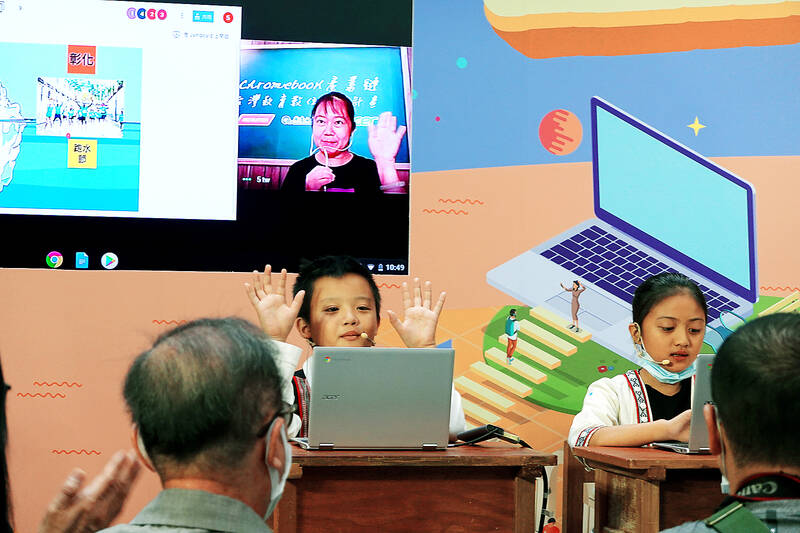Global Chromebook shipments plunged 48 percent year-on-year to 19.2 million units last year, as consumers tightened their belts amid an economic downturn, International Data Corp (IDC) said in a report on Friday last week.
Total shipments plummeted to 19.2 million units from 2021, when sales surged 180.5 percent year-on-year to 36.9 million units, bolstered by demand for remote learning at the height of the COVID-19 pandemic, IDC said.
Fourth-quarter shipments declined 24.3 percent from a year earlier to 3.6 million units, marking six straight quarters of declines, as PC sales came under pressure from weaker work-from-home and online learning demand as the COVID-19 pandemic eased, IDC data showed.

Photo: Bill Chen, Taipei Times
Even though the pandemic has brought about positive changes to Chromebook adoption and market watchers believe such devices would continue to play a fundamental role in education, consumer spending has weakened in the face of a slowing economy and still-high inflation worldwide.
“While Chromebooks have faced a tough few quarters, the excess channel inventory that had built up is starting to subside and could potentially lead to more normalized growth in the coming quarters as back-to-school season returns,” IDC mobility and consumer device research manager Jitesh Ubrani said in a statement.
“However, any traction that Chromebooks made outside the education sector will continue to suffer, as the economy stalls and as tablets and PCs supplant Chrome-based devices,” Ubrani said.
PC vendor Acer Inc (宏碁) last year ranked first in the global Chromebook market, although the company only shipped 4.2 million units, 33.8 percent less than a year earlier, IDC data showed.
That gave the Taiwanese firm a 22 percent market share in the year, up from 17.3 percent in 2021.
Dell Technologies Inc was second with shipments of 4.1 million, down 24.3 percent from the previous year, for a market share of 21.3 percent.
Lenovo Group Ltd (聯想) placed third with 3.7 million units, dipping 54.4 percent year-on-year, for a market share of 19.5 percent.
HP Inc ranked fourth, with shipments of 3.5 million units, down 65.6 percent, followed by Asustek Computer Inc (華碩), which shipped 1.3 million units, 20.9 percent less than in 2021, IDC data showed.
The two secured market shares of 18.4 percent and 6.8 percent respectively, IDC said.

Semiconductor shares in China surged yesterday after Reuters reported the US had ordered chipmaking giant Taiwan Semiconductor Manufacturing Co (TSMC, 台積電) to halt shipments of advanced chips to Chinese customers, which investors believe could accelerate Beijing’s self-reliance efforts. TSMC yesterday started to suspend shipments of certain sophisticated chips to some Chinese clients after receiving a letter from the US Department of Commerce imposing export restrictions on those products, Reuters reported on Sunday, citing an unnamed source. The US imposed export restrictions on TSMC’s 7-nanometer or more advanced designs, Reuters reported. Investors figured that would encourage authorities to support China’s industry and bought shares

TECH WAR CONTINUES: The suspension of TSMC AI chips and GPUs would be a heavy blow to China’s chip designers and would affect its competitive edge Taiwan Semiconductor Manufacturing Co (TSMC, 台積電), the world’s biggest contract chipmaker, is reportedly to halt supply of artificial intelligence (AI) chips and graphics processing units (GPUs) made on 7-nanometer or more advanced process technologies from next week in order to comply with US Department of Commerce rules. TSMC has sent e-mails to its Chinese AI customers, informing them about the suspension starting on Monday, Chinese online news outlet Ijiwei.com (愛集微) reported yesterday. The US Department of Commerce has not formally unveiled further semiconductor measures against China yet. “TSMC does not comment on market rumors. TSMC is a law-abiding company and we are

FLEXIBLE: Taiwan can develop its own ground station equipment, and has highly competitive manufacturers and suppliers with diversified production, the MOEA said The Ministry of Economic Affairs (MOEA) yesterday disputed reports that suppliers to US-based Space Exploration Technologies Corp (SpaceX) had been asked to move production out of Taiwan. Reuters had reported on Tuesday last week that Elon Musk-owned SpaceX had asked their manufacturers to produce outside of Taiwan given geopolitical risks and that at least one Taiwanese supplier had been pushed to relocate production to Vietnam. SpaceX’s requests place a renewed focus on the contentious relationship Musk has had with Taiwan, especially after he said last year that Taiwan is an “integral part” of China, sparking sharp criticism from Taiwanese authorities. The ministry said

US President Joe Biden’s administration is racing to complete CHIPS and Science Act agreements with companies such as Intel Corp and Samsung Electronics Co, aiming to shore up one of its signature initiatives before US president-elect Donald Trump enters the White House. The US Department of Commerce has allocated more than 90 percent of the US$39 billion in grants under the act, a landmark law enacted in 2022 designed to rebuild the domestic chip industry. However, the agency has only announced one binding agreement so far. The next two months would prove critical for more than 20 companies still in the process